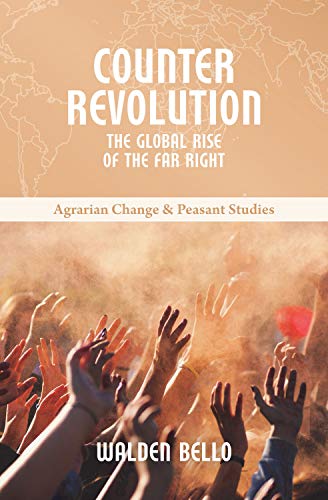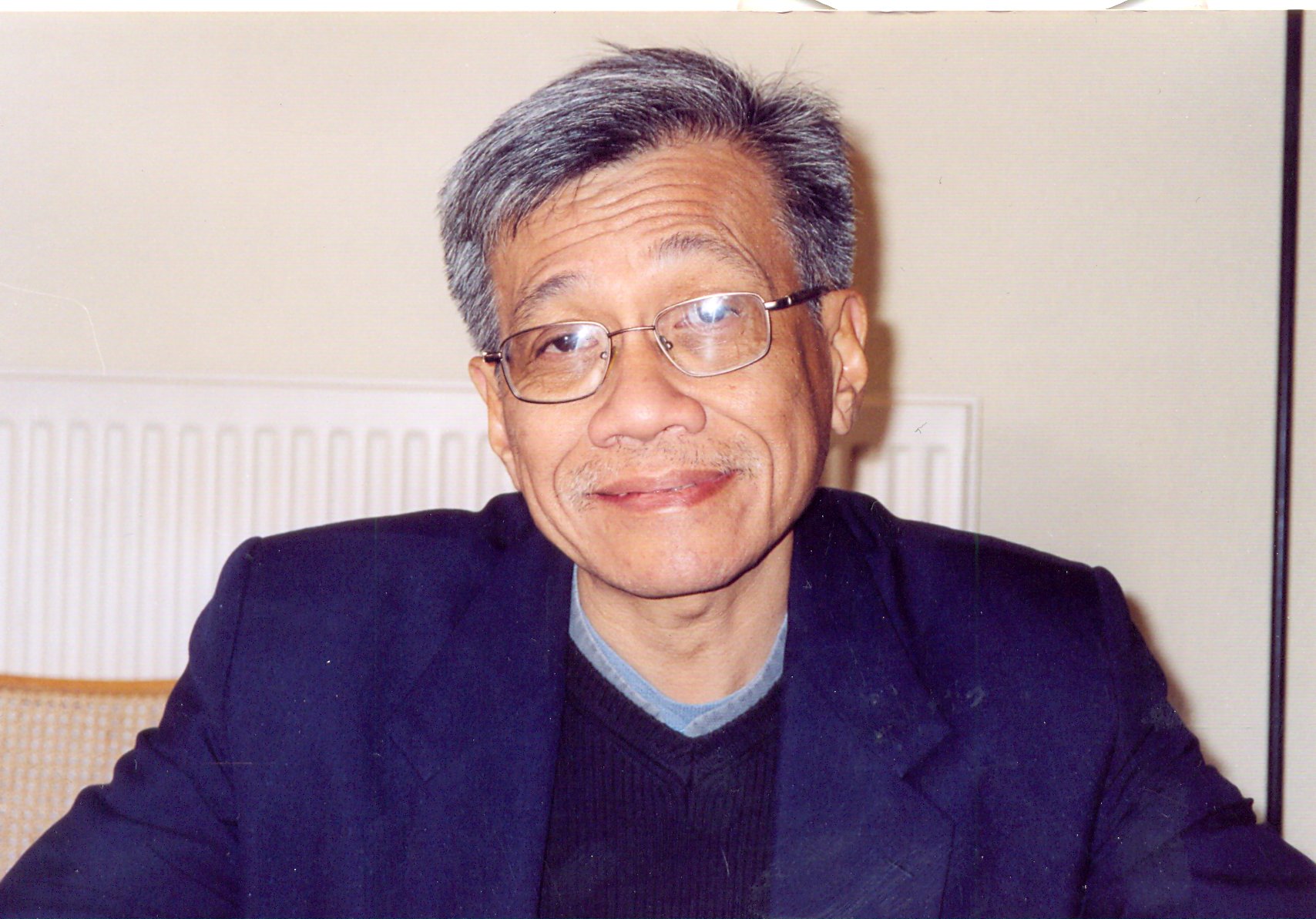Editorial team of Ecología Política*
Walden Bello is currently a professor of sociology at the State University of New York at Binghamton and senior research fellow at the Center for Southeast Asian Studies of Kyoto University in Japan. He served as a member of the House of Representatives of the Philippines from 2009 to 2015, during which he was chairman of the Committee on Overseas Workers Affairs.
Image 1: Cover of the book Counterrevolution. Source: waldenbello.org

What do you mean when you say that the rise of the far right is a global “counter-revolution”?
Counterrevolution is the most useful concept we can use to understand the rise of the far
right, rather than, say, populism, which denotes a political style and is bereft of substance. As I contend in my book Counterrevolution: The Global Rise of the Far Right, there are two types of counterrevolution. One is the classic counterrevolution that is a response of threatened elites and middle classes to an upsurge from below, from the lower classes. This kind of situation is common in the global South, where progressive reform programs based on the peasantry and workers are seen as threatening the economic position of the upper class and the middle class. The political dynamics in Indonesia in 1965, Chile in 1973, and Thailand in 2014 fell into this category. The other is a counterrevolution against liberal democracy, one that is a response to the failure of this political regime to promote or defend the interests of social groups that had initially supported it, like the middle class. In Europe and the US, for instance, the base of the far right are sectors of the working class and lower middle that feel that the economic and social status they had enjoyed under the old democratic welfare state has been eroded by established center-right and center-left elites promoting anti-worker neoliberal policies who are seen as being in an alliance with minorities and migrants that seek to “steal” their benefits and privileges.
What are the main common traits amongst far-right governments, in the Global South and North?
Well, there are several points of convergence. Several far-right personalities and groups that come to power or to the antechamber of power have strong authoritarian tendencies and have no qualms about weakening democratic institutions if they can get away with it. Rodrigo Duterte of the Philippines, Victor Orban of Hungary, and Donald Trump are very similar in this regard. Their leading personalities are charismatic, at least from the perspective of their bases. They mobilize by scapegoating, that is generating and focusing the hatred of the cultural or racial majority on minorities and migrants. Even as they present themselves as “anti-establishment” or anti-elite, they do not seek a change of the economic regime nor do they really threaten the position of the economic elites. They make anti-liberal sentiments and discourse legitimate, like Duterte boasting that he will kill people, and liberal sentiments and discourse illegitimate, like Narendra Modi of India redefining “secularism” as a bad thing. There are, of course, some differences between far-right leaders in the global North and South. Modi and Duterte, for instance, have neoliberal economic programs, while Trump, Orban, and Marine Le Pen of France take selected anti-neoliberal measures like withdrawing the US from the Trans-Pacific Partnership or promoting selected welfare state initiatives but saying these are only for people of the “right” community, with the “right” religion, and “right” culture.
In this issue we’re looking specifically at the “Political ecology” of the far right – What role do ecology and the environment play in this global counter-movement, in your opinion?
Well, there has always been a political ecology of the right. Back in the seventies, it was represented by Malthusians like Garret Hardin, who said that overpopulation was the greatest threat to the environment and this overpopulation was coming mainly from the reproductively active global South. Hardin, in fact, said that the world was faced with having to practice triage, that is to leave large parts of humanity, mainly in the global South, to misery so as to preserve environmental integrity that would support a minority of the population, mainly in the global North. Of course, he spoke in seemingly neutral terms, but everyone knew he meant much of the global South would have to be sacrificed so the planet could support the smaller populations of the developed countries.
Even James Lovelock doesn’t seem to care if global population is reduced to one billion since the planet would be “happier.” Concern about the planet’s carrying capacity owing to overpopulation by the poorer countries of the global South is the entry point of environmentalist consciousness into the right wing. Unfortunately, it is a twisted environmentalism. I suspect that there are not a small number of people in the North who think they are environmentalists who are for strong migration controls. Some are becoming more outspoken while others are not yet ready to be caught out as “politically incorrect.”
What do you think of the idea of “eco-fascism”?
Eco-fascism may not be a serious movement at this point, but it can develop if the global climate continues to deteriorate and people in the global North do not want to restrain their consumption and refuse to make the changes in the production structure to bring down carbon emissions. Prodded by leaders like Trump, they may choose, instead, to scapegoat the countries of the global South and leave the burden of adjustment to the latter. In place of making vital changes in production and consumption, they may also choose to support more stringent border controls and draconian immigration policies saying more people coming into Europe and the US and Japan would result in more environmental destruction and a lowering of the quality of life of people already there. The people most permeable to eco-fascism would be middle and working class people who don’t want to make adjustments in their lifestyle and prefer to find the cause of the deterioration of their quality of life in migrants. Eco-fascism and racism could make common cause.
Is there a contradiction between the tendency towards appropriating environmental discourse on the part of the far right, and the fact that environmental regulation is being rolled back in favour of business interests?
Well, if environmental consciousness takes the form of fear of overpopulation and deterioration of quality of life because of faster rates of reproduction by minorities and liberal immigration policies and does not extend to a critique of capitalism as the greatest destabilizer of the environment, then there is no contradiction in being supposedly an “environmentalist” and being pro-business as usual.
Historically, a romantisised view of the countryside had a key role in the emergence of the far right in Italy and other countries. Is this the case today?
I think much less so than in the case of classical fascism, and this is understandable since the experience of the key sectors that the far right tries to mobilize have lost all organic connection to the countryside and live almost wholly in an urban context. With rural areas in distress all over the global North and the global South, the countryside is a place you escape from, not a refuge. What is romanticized instead is the nation, a community linked by blood, language, culture, religion, and race.
What do you think of the idea of a Left populism? Do you think it could be a necessary and viable strategy to confront fascist counterrevolutions?
The reason I do not like to use the word populism to describe the politics of the far right is that it is bereft of substantive content. Populism is a political style, that is one that appeals to the people directly and without the mediation of political parties. In this sense, Indira Gandhi, Narendra Modi, and Hugo Chavez may be thought of as populists though their programs were very different. One can be a populist of the left or one of the right. Certainly, I would support a left populist program that would mobilize workers to support a program of radical redistribution of wealth from the elite to the lower classes. But I would oppose a right-wing populist program that seeks to mobilize white workers against migrants by agitating the former that the benefits for the latter would come at their expense.
Which institutional structures built by what you refer to as the discredited elite democracy do you think could be useful to build an alternative socio-ecological model?
There are a number of institutions of liberal democracy that would be important to retain and transform. Political parties are necessary in any form of democracy. Due process is an important restraint on authoritarian rule. The separation of powers is also an important brake on authoritarian rule. I think where the key differences would lie are in the following areas: 1) Representation—the alternative model would rely more on direct democratic and participatory processes rather than on traditional representative mechanisms; 2) Decision-making—the alternative would extend democratic decisionmaking to the economy, and it would do this “upwards” by making macroeconomic decisions now made by technocrats subject to democratic approval and “downwards” by making workers take part in democratic management of the firm; 3) Constitutional principles—Equality must be made the centerpiece of the constitution, with provisions that specify that significant wealth and income inequality will not be tolerated, and once inequalities hit a certain level, redistributive mechanisms will kick in.
You call for “stronger state and civil society management of the economy, one that moves it beyond capitalism” – can you elaborate on your visions of political transformation?
The end goal of political economy must be a system that allows for the full development of human beings and promotes a harmonious relationship between the human community and the biosphere. Capitalism fails on both counts owing to its inherent tendency to generate inequality as well as contradiction between the economy and the environment. One of the key problems of the old socialism, whether of the communist or social democratic sort, was that it was statist, that is, it made the state the unrestrained agent of everything. The state, however, has inherent dynamics that, if unchecked, result in hierarchy and other forms of power inequality, in other words, an iron cage of bureaucratic rationality, to use Max Weber’s term. Civil society must be mobilized to check the state at all levels, as well as to check what is likely to be a hybrid economic organization involving the state, cooperatives, private enterprises, and other types of productive units. The interaction between these three key actors—the state, the economy, and civil society—will generate conflicts, of course, but it will also create synergy.
Important intellectuals like Naomi Klein see in climate change an opportunity for a reinvigorated mass movement, capable of radically transforming capitalism from below – do you agree?
Yes, I do definitely agree with my good friend Naomi on this point. The success of the Greens in the 2019 elections to the European parliament, I think, reflected this potential of the climate question to mobilize people along progressive lines. I would add the women’s movement. The synergy of these two dynamic movements could prove to be a great transformative force.
You have long studied the role of middle class in undermining radical transformation. Do you think that the Left is facing a contradiction in the context of the ecological crisis: that of having to put forward a radical reconfiguring of production and consumption, which may alienate middle classes that will likely feel threatened by such radical change?
I think it all depends on how we approach the middle class. If we try to appeal to people in the middle class mainly on the basis of their allegedly having the same common interest as other groups against a tiny capitalist elite—as the left did in Chile—they probably won’t be drawn to our side. But if we approach them to be part of a great human enterprise for the survival of the planet, one that appeals to their better instincts and brings them out of their limited individual and class concerns, the result could be different. That was the key factor in the anti-fascist struggle in the Second World War. People went willingly to fight and die for democracy because democracy was a noble cause that transcended class concerns. Values, not interests, are key. Constantly appeal to values, not interests.
The spread of coronavirus threatens to increase nationalist responses to the crisis. What do you think should be done to counter this?
I think we must fight for a common internationalist response and, in fact, not only make sure that the multilateral institutions deliver massive aid to developing countries but that the global supply chains in agriculture and industry keep functioning so as to prevent starvation and a global depression. That, however, is only in the short term. Strategically, we must move towards eventually dismantling the supply chains in favor of more ecologically and socially congenial localized production.
Let me expand on this a bit. This is the third warning in less than 20 years we’ve had to abandon globalization. The first was the 2007-2008 food price crisis caused by massive disruptions in the global food supply chains. The second was the 2008 global financial crisis and the follow-on recession in the global real economy. As they say in American baseball, three strikes and you’re out. After the global financial crisis of 2008, triggered by financial globalization, which brought on recession in the global real economy, the path to be followed afterwards should have been to deglobalize production. Instead, the world embarked on a new phase of globalization, known as «connectivity,» led by China.
Drawing the parallel to digital connectivity, infrastructure connectivity and transportation connectivity, especially air connectivity, was extolled as the key to successful globalization. When the virus came, air connectivity became its principal way of spreading it very swiftly. And when China stopped its industries to deal with the virus, the world lurched on into economic crisis because industrial connectivity had resulted in so much many global supply chains having their point of departure in China. So the main lesson is that instead of being the route to prosperity, as its partisans claimed, globalization has been the path to disaster. Will the world absorb this lesson this time? That is the question.
—
* The interview was conducted by the editorial team of Ecología Política formed by Diego Andreucci, Santiago Gorostiza, Geovanna Lasso, Christos Zografos y Marien Gonzalez-Hidalgo.
—







